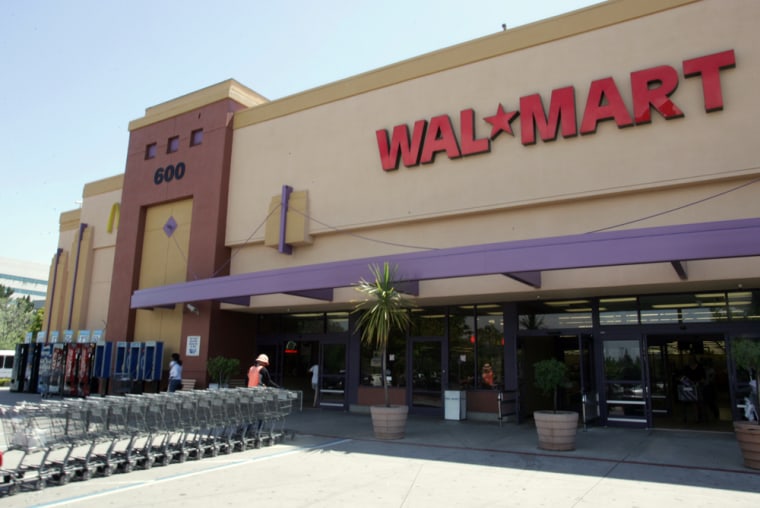The new Democratic majority in Congress will bring both good and bad news for Wal-Mart Stores Inc., which could benefit from a minimum wage hike but faces the possibility of congressional hearings on labor practices and health care at the nation’s largest private employer, analysts said Wednesday.
Wal-Mart’s core lower-income shoppers could get more disposable income if Democrats push through a raise in the federal minimum wage of $5.15 an hour. Rep. Nancy Pelosi, set to become the new House leader, said raising the base wage for the first time since 1997 would be one of the Democrats’ legislative priorities for the 110th Congress that opens in January.
Wal-Mart Chief Executive Officer Lee Scott has backed an increase, saying many Wal-Mart customers are low-income families that struggle from month to month. The company has said its costs would not be affected because it pays above the federal minimum, with an average full-time wage of $10.11 an hour.
“We feel the federal minimum wage should be increased and it is up to Congress to decide what that number should be. We are not lobbying for any particular bill,” Wal-Mart spokesman David Tovar said.
Even a small increase would mean more cash for lower-income households that could be spent at Wal-Mart, said fund manager Patricia Edwards. The average household income of Wal-Mart shoppers is around $35,000 to $40,000, compared with $55,000 to $60,000 for those at rival Target Corp., Edwards said
“The minimum wage doesn’t come into much play on Wal-Mart’s cost side. On the revenue side, it really will help their lower-end shopper,” said Edwards, a portfolio manager and retail analyst at Wentworth, Hauser & Violich in Seattle, which manages $8.2 billion in assets and holds 51,000 Wal-Mart shares.
Don Gher, chief investment officer at Coldstream Capital Management in Bellevue, Wash., which manages over $1 billion in assets including Wal-Mart shares, was more skeptical that Wal-Mart would gain much in sales from a higher national minimum wage.
“I don’t think it’s going to be a major factor either way” on costs or new spending, Gher said.
Gher said the main concern for Wal-Mart will be whether Democrats use their newfound power to hold congressional hearings on issues like health insurance, wages and labor practices, where Wal-Mart has been criticized by unions and some Democrats.
“They’ve used Wal-Mart as a whipping boy before and that’s an indication that they are going to continue. I think we’ll see more negative press coming out of hearings like that,” Gher said.
Democrats in the House and possibly Senate can be expected to call Wal-Mart executives on the carpet as part of broader hearings aimed at putting pressure on corporate America to improve health insurance and keep more jobs at home, said Gary N. Chaison, professor of industrial relations at Clark University in Worcester, Mass.
“Wal-Mart is huge and more people know its name, so it gets attention,” Chaison said.
“I think Wal-Mart representatives should be preparing already to make their case in front of congressional hearings on employment practices and health care,” he said.
Union-backed critics and some Democrats have accused Wal-Mart of skimpy pay and health insurance for its more than 1.3 million U.S. workers and pushing some onto taxpayer-funded health plans like Medicaid.
Wal-Mart has defended its wages and record of job creation. It has also introduced lower premium health plans for as little as $11 a month in some areas and has cut prices for some generic drugs to $4 for a 30-day prescription in 27 states, with more states to come.
Wal-Mart’s Tovar said the company is ready to work with both political parties to find what he called “real solutions to the challenges facing working families today”.
“But special-interest schemes that impose arbitrary benefit mandates on large employers are not the answer to the real issues of health care cost and affordability,” Tovar said.
As a negative example, Tovar cited a Maryland law passed by the Democratic legislature this year and then struck down in court that would have required the state’s largest private employers to spend 8 percent of payroll on health insurance or pay the difference in taxes. Wal-Mart opposed that bill.
WakeUpWalMart.com, one of two union-backed campaign groups started last year to pressure Wal-Mart to change, said it expects a Democratic Congress to probe the retailer over its health care as well as the large amount of goods it buys from overseas.
“Bottom line, Wal-Mart will have to rethink its ’buy anywhere but America’ strategy and start to reinvest in American jobs and factories, or face further rebuke from Congress and the American people,” said WakeUpWalMart spokesman Chris Kofinis.
Kofinis said Wal-Mart had made a mistake by donating heavily to Republican candidates at a time when “the American people want Wal-Mart and other large corporations to change, do what is right, and be responsible.”
Republicans received 71 percent of the $1.08 million donated by Wal-Mart’s political action committee and employees to federal candidates in this election cycle, compared with 98 percent for Republicans in 1996, according to the Center for Responsive Politics.
Tovar said Wal-Mart was a bipartisan company.
“We find the doors open to us across the political spectrum when we share the good things we are doing as a company to make a difference in America like environmental sustainability, providing $4 generic drugs, job creation, and the millions of dollars that we give to local charitable organizations,” Tovar said.
